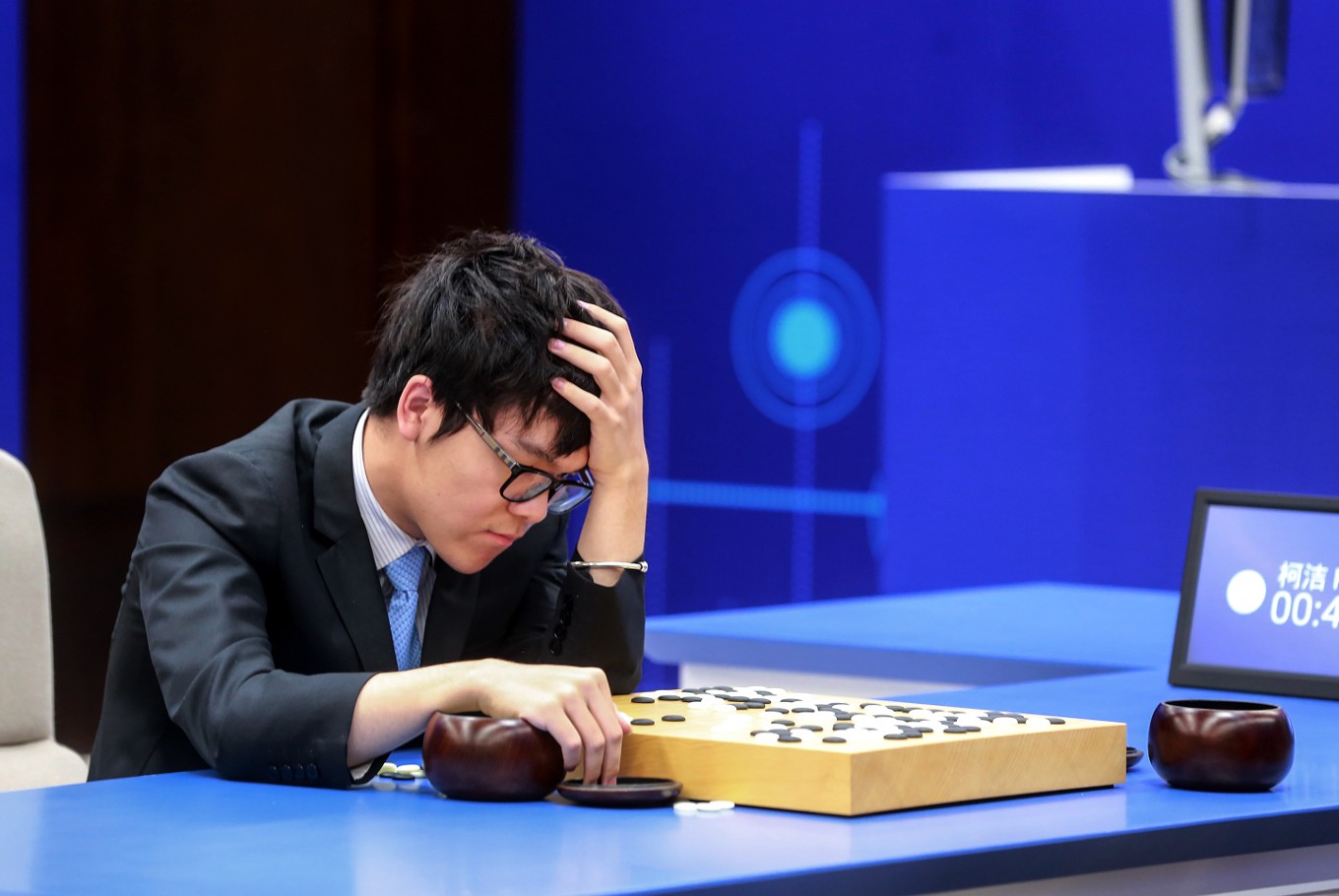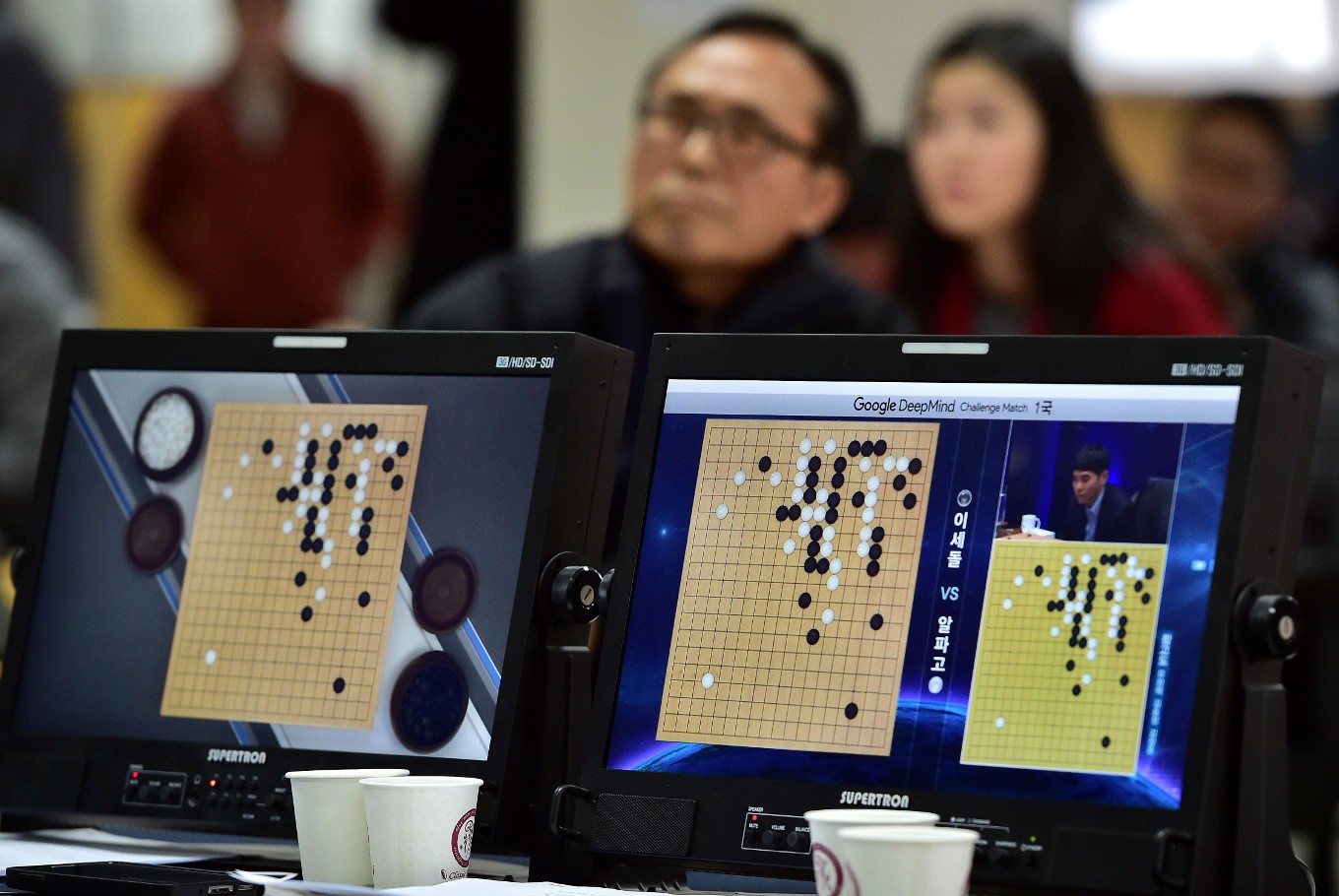Popular Reads
Top Results
Can't find what you're looking for?
View all search resultsPopular Reads
Top Results
Can't find what you're looking for?
View all search resultsChinese fans trash blackout as Google AI wins again
Change text size
Gift Premium Articles
to Anyone
 China's 19-year-old Go player Ke Jie reacts during the second match against Google's artificial intelligence program AlphaGo in Wuzhen, eastern China's Zhejiang province on May 25, 2017. Chinese netizens fumed on May 25 over a government ban on live coverage of Google algorithm AlphaGo's battle with the world's top Go player, as the program clinched their three-match series in the ancient board game. (STR / AFP/File)
China's 19-year-old Go player Ke Jie reacts during the second match against Google's artificial intelligence program AlphaGo in Wuzhen, eastern China's Zhejiang province on May 25, 2017. Chinese netizens fumed on May 25 over a government ban on live coverage of Google algorithm AlphaGo's battle with the world's top Go player, as the program clinched their three-match series in the ancient board game. (STR / AFP/File)
C
hinese netizens fumed Thursday over a government ban on live coverage of Google algorithm AlphaGo's battle with the world's top Go player, as the program clinched their three-match series in the ancient board game.
The artificial intelligence (AI) program won its second straight match against 19-year-old Chinese world number one Ke Jie, who will try to salvage some pride for humanity in the third and final game on Saturday.
This week's series in the eastern Chinese city of Wuzhen has been closely watched by futurists and Go fans curious over whether AlphaGo could beat the world's best, after making headlines last year by trouncing a South Korean grandmaster.
But Chinese fans struggled to get information on the event after authorities banned live coverage, amid online speculation in China that it was linked to Google's tense history with Beijing.
Google shut down its www.google.cn website in 2010 in a row over cyberattacks and Chinese censorship, and most of its offerings have remained blocked by authorities.
That made for an awkward situation in the Go series, in which the company's corporate logos have been clearly visible on live stream broadcasts.
This week's match-up received considerable attention in Chinese media in the run-up, but live coverage was abruptly banned shortly before the first match, according to a government directive to media outlets that was widely circulated online.
Anger online
The notice said the contests "may not be broadcast live in any form, without exception, including text commentary, photography, video streams, self-media accounts, etc."
A Google spokesman could not immediately be reached for comment.
Chinese fans denounced the ban.
 This file photo taken on March 9, 2016 shows South Korean Go game fans watching a television screen broadcasting live footage of the Google DeepMind Challenge Match in Seoul. It's man vs machine this week as Google's artificial intelligence program AlphaGo faces the world's top-ranked Go player in a contest expected to end in another victory for rapid advances in AI. China's 19-year-old Ke Jie is given little chance in the three-game series beginning May 23, 2017 in the eastern Chinese city of Wuzhen after AlphaGo stunned observers last year by trouncing South Korean grandmaster Lee Se-Dol four games to one.(AFP/Jung Yeon-Je)
This file photo taken on March 9, 2016 shows South Korean Go game fans watching a television screen broadcasting live footage of the Google DeepMind Challenge Match in Seoul. It's man vs machine this week as Google's artificial intelligence program AlphaGo faces the world's top-ranked Go player in a contest expected to end in another victory for rapid advances in AI. China's 19-year-old Ke Jie is given little chance in the three-game series beginning May 23, 2017 in the eastern Chinese city of Wuzhen after AlphaGo stunned observers last year by trouncing South Korean grandmaster Lee Se-Dol four games to one.(AFP/Jung Yeon-Je)
Read also: Samsung investigating Galaxy S8 'iris hack'
"I just lost my chance to witness such a historic moment. I feel so terrible," wrote one user on China's Twitter-like Weibo platform.
Another user asked: "Has the political environment become so dangerous that covering something that has gained public attention has become impossible?"
AlphaGo was developed by London-based AI company DeepMind Technologies, which Google acquired in 2014.
Its win last year over South Korean grandmaster Lee Se-Dol marked the first time a computer program had beaten a top player in a full contest and was hailed as a landmark for AI.
Ke, who last year said he would never lose to a machine, accepted defeat after game one, calling AlphaGo a "Go god".
For some, AI advances conjure sci-fi images of machines enslaving humanity.
But for AI proponents, AlphaGo's feats have fuelled visions of AI that can not only perform mundane tasks, but potentially help mankind figure out some of the most complex scientific, technical and medical problems.
Computer programs have previously beaten humans in cerebral contests, starting with the victory by IBM's Deep Blue over chess grandmaster Garry Kasparov in 1997.
But AlphaGo's success is considered the most significant yet for AI due to the complexity of Go, which has an incomputable number of move options and puts a premium on human-like "intuition".
Go involves two players alternately laying black and white stones on a grid, seeking to seal off the most territory.
AlphaGo's "thinking" is powered by millions of connections similar to neurons in the brain. It is partly self-taught, having played millions of games against itself.










